Sensor Sweep: Robert Bloch, Flashing Swords, Dragonbane
Monday , 21, April 2025 Sensor Sweep Leave a commentEdgar Rice Burroughs (Walker’s Library): A Princess of Mars2 not only began on of Edgar Rice Burroughs’ many long-running series of adventure novels—alongside the Tarzan, Venus, and Pelludicar stories—but this one novel set a standard for fantastic adventure fiction that cast a shadow so long that many of you don’t realize that you’re standing in it.
Robert E. Howard (Frontier Partisans): Just discovered that there is a brand new biography of Robert E. Howard — a serious look at the writer who above all others inspired me to take up hammering on a keyboard. I am far from alone in that inspiration.
Pulp (Paperback Warrior): Crossen’s first published story may have been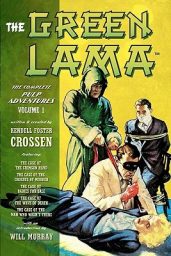 “The Killer Fate Forgot”, a western story written with Harry Levin that appeared in 10 Story Western Magazine in January 1938. Sometime in the late 1930s Crossen quit his editing job and moved to Florida. In 1939, he wrote three crime-fiction stories that appeared in Detective Fiction Weekly, one of which used the byline of Bennett Barlay. Crossen continued using the Barlay name in 1940 with four more stories in Detective Fiction Weekly.
“The Killer Fate Forgot”, a western story written with Harry Levin that appeared in 10 Story Western Magazine in January 1938. Sometime in the late 1930s Crossen quit his editing job and moved to Florida. In 1939, he wrote three crime-fiction stories that appeared in Detective Fiction Weekly, one of which used the byline of Bennett Barlay. Crossen continued using the Barlay name in 1940 with four more stories in Detective Fiction Weekly.
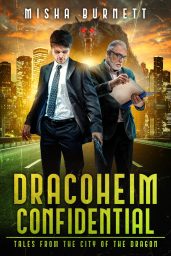 Fiction (Cirsova): Return to the magical realm of Dracoheim! For the city at the nexus of myriad strange and sorcerous alien worlds, magic and monsters have become just another part of everyday life.
Fiction (Cirsova): Return to the magical realm of Dracoheim! For the city at the nexus of myriad strange and sorcerous alien worlds, magic and monsters have become just another part of everyday life.
Fiction (Rough Edges): This is the second volume in Ben Haas’s outstanding series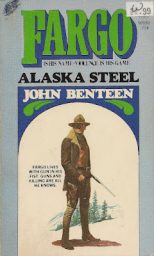 about soldier of fortune Neal Fargo. It opens in Hollywood in 1914, where Fargo is working temporarily as an actor, of all things, playing a villain in a silent Western movie directed by Thomas Ince. Ince is the only real-life character to make an appearance in this novel; the hero of the picture is fictional, as is a beautiful actress Fargo meets.
about soldier of fortune Neal Fargo. It opens in Hollywood in 1914, where Fargo is working temporarily as an actor, of all things, playing a villain in a silent Western movie directed by Thomas Ince. Ince is the only real-life character to make an appearance in this novel; the hero of the picture is fictional, as is a beautiful actress Fargo meets.
Warhammer (Presidential Dice Rolls): Iterator Tucker Carlson of the Imperial Remembrancer Order interviews Warmaster Horus Lupercal aboard the Vengeful Spirit in the 14th year of the 31st Millennium.
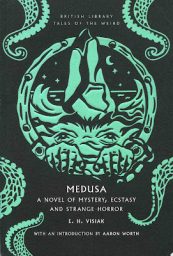 Fiction (Wormwoodiana): The British Library, in their Tales of the Weird series, has just published a reprint of E.H. Visiak’s rare 1929 novel, Medusa. It is introduced by Aaron Worth, and he begins, appropriately, with the bizarre position that Medusa has come to occupy to moderns readers. Owing to hyperbolic nonsense from Karl Edward Wagner (in his infamous 1983 Twilight Zone magazine lists), most readers of Medusa in the last forty-plus years have come to the book with completely mistaken expectations.
Fiction (Wormwoodiana): The British Library, in their Tales of the Weird series, has just published a reprint of E.H. Visiak’s rare 1929 novel, Medusa. It is introduced by Aaron Worth, and he begins, appropriately, with the bizarre position that Medusa has come to occupy to moderns readers. Owing to hyperbolic nonsense from Karl Edward Wagner (in his infamous 1983 Twilight Zone magazine lists), most readers of Medusa in the last forty-plus years have come to the book with completely mistaken expectations.
VRPG (Kairos): When Final Fantasy VII released in 1997, it marked a turning point for JRPGs and video games in general. This Final Fantasy was the first mainline entry to hit the PlayStation, the first to use 3D graphics and full-motion video, and the first to receive a major marketing push in the West. It introduced a lot of players to the JRPG genre. It also introduced a lot of problems that have stuck with the industry ever since.
Fantasy (Black Gate): It’s time to take a look at another Sword & Sorcery anthology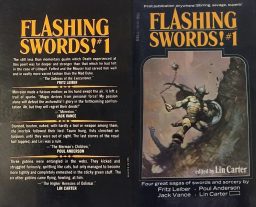 series I really love: Flashing Swords, edited by Lin Carter. It is second in my affections only to the Swords Against Darkness 5-book series edited by Andy Offutt that I wrote about here last year. Flashing Swords! came out of the group known as SAGA, which stood for the Swordsmen and Sorcerers Guild of America, a group in the 1970s and 80s that included almost all the elite S&S writers of the age.
series I really love: Flashing Swords, edited by Lin Carter. It is second in my affections only to the Swords Against Darkness 5-book series edited by Andy Offutt that I wrote about here last year. Flashing Swords! came out of the group known as SAGA, which stood for the Swordsmen and Sorcerers Guild of America, a group in the 1970s and 80s that included almost all the elite S&S writers of the age.
Fantasy (Ink and Fantasy): In this video we explore why fantasy has been feeling increasingly generic recently, as well as what distinguishes good fantasy from bad and generic fantasy!
 RPG (Grognardia): After seeing that advertisement for the James Bond 007 RPG, I found myself thinking about it, something I hadn’t done in quite some time. I’ve been a fan of the espionage genre since I was quite young, influenced at least in part by my affection for the early James Bond films.
RPG (Grognardia): After seeing that advertisement for the James Bond 007 RPG, I found myself thinking about it, something I hadn’t done in quite some time. I’ve been a fan of the espionage genre since I was quite young, influenced at least in part by my affection for the early James Bond films.
Comic Books (Michael K. Vaughn): Solomon Kane: The Mark of Kane
Fiction (Paperback Warrior): Edgar Award winner Robert Arthur Jr. (1909-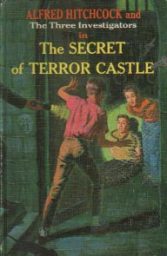 1969) attended college at William & Mary and University of Michigan. After graduation he worked as an editor and wrote stories for magazines like Collier’s, Black Mask, Thrilling Detective, and The Phantom Detective. He later moved to Hollywood to write screenplays, television, and radio scripts. But, his most successful creation was a juvenile fiction series originally titled Alfred Hitchcock and The Three Investigators.
1969) attended college at William & Mary and University of Michigan. After graduation he worked as an editor and wrote stories for magazines like Collier’s, Black Mask, Thrilling Detective, and The Phantom Detective. He later moved to Hollywood to write screenplays, television, and radio scripts. But, his most successful creation was a juvenile fiction series originally titled Alfred Hitchcock and The Three Investigators.
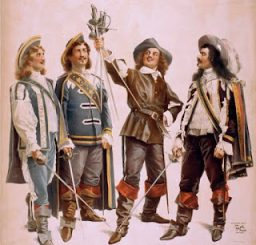 Fantasy (Paul McNamee): I finished reading THE THREE MUSKETEERS by Alexandre Dumas last night. Thick book. A post-worthy accomplishment, I feel. I liked it a lot. More than imagined I would. I don’t know about earlier English editions. I read the 2018 Lawrence Ellsworth translation.
Fantasy (Paul McNamee): I finished reading THE THREE MUSKETEERS by Alexandre Dumas last night. Thick book. A post-worthy accomplishment, I feel. I liked it a lot. More than imagined I would. I don’t know about earlier English editions. I read the 2018 Lawrence Ellsworth translation.
Cinema (Black Gate): Duel begins in the most prosaic fashion imaginable, with salesman David Mann (Dennis Weaver) backing his red Plymouth Valiant out of his modest suburban garage and heading north for an important meeting with a client; almost all of the first five minutes of the film are through-the-windshield POV shots of the early stages of Mann’s journey. We see him motor up CA 5 through Los Angeles and the San Fernando Valley.
Popular Culture (Tree of Woe): Transgressive realism became a force in the late 19th century, as e.g. the writings of Oscar Wilde, such as The Picture of Dorian Grey, challenged Victorian moral values and the paintings of Édouard Manet scandalized society with their nudity.Among more recent luminaries of transgressive realism are Vladimir Nabokov (author of 1955’s Lolita); John Waters (filmmaker of 1972’s Pink Flamingos); Pier Paolo Pasolini (director of 1975’s 120 Days of Sodom); and Larry Clark (filmmaker of 1995’s Kids).
Conventions (Black Gate): Doug Ellis puts on the Windy City Pulp and Paper Convention annually at the Lombard Westin, in the suburb an hour west of Chicago. I last attended in 2019. Of course, COVID hit in 2020, along with some other life changes. I made it to my first Howard Days in 2022, and headed over to Pittsburgh the last two years for Pulp Fest. Windy City just didn’t quite happen. But I made sure it did in 2025.
Fantasy (Ken Lizzi): I picked up this collected edition of Mary Stewart’s Merlin Trilogy only in part because of the oddly endearing, but perhaps misleading Hildebrandt Bros. cover.
Tolkien (Stuff I Like): He lifted his heavy eyes and saw leaning over him a huge willow-tree, old and hoary. Enormous it looked, its sprawling branches going up like reaching arms with many long-fingered hands, its knotted and twisted trunk gaping in wide fissures that creaked faintly as the boughs moved. The leaves fluttering against the bright sky dazzled him, and he toppled over, lying where he fell upon the grass.
RPG (Grognardia): For those unfamiliar with it, Dragonbane is the modern English-language evolution of Drakar och Demoner, Sweden’s first major fantasy RPG, originally released in 1982. That game was built on Chaosium’s Basic Role Playing (BRP) system, adapted under license and inspired in part by Magic World and RuneQuest.
Fantasy (The Silver Key): Character matters. There is truth in the world of ideas. I was listening to a podcast the other day. One of the guests–an author, self-described philosopher, and entrepreneur—concluded a view of the world I find abhorrent: Objective truth does not exist, values are manufactured and none better than others, and the purpose of life is maximizing personal happiness.
Fantasy (Swords Lore): The three prevalent book series that have been showing up on other posts discussing this subject are Outlander by Diana Gabaldon, Sarah J. Maas’ A Court of Thorns and Roses, and The Empyrean Series by Rebecca Yarros. The examples are not limited to these three, but they are the series consistently mentioned by reviewers who have criticized their use and portrayal of Celtic languages.
Mythos (Marzaat): While I’ve given this the “Cthulhu Mythos” tag solely on the basis of appearing in this book, I would really consider it one. First, this is a reprint anthology, and the original story appeared in an anthology called Hallows a magazine called All Hallows, and I don’t know if that’s a Mythos anthology.
Horror (Adventures Fantastic): Today, April 5, is the birthday of Robert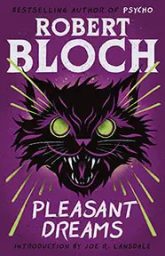 Bloch (1917-1994). Valancourt Books has begun reprinting a number of titles by Robert Bloch. Today’s story is from Pleasant Dreams. This was one of Bloch’s first collections that moved away from Lovecraft pastiche.
Bloch (1917-1994). Valancourt Books has begun reprinting a number of titles by Robert Bloch. Today’s story is from Pleasant Dreams. This was one of Bloch’s first collections that moved away from Lovecraft pastiche.
This is a great collection and one that is worth checking out. If you’ve read much Bloch, you’ll frecognize a number of the tales therein, but Bloch is always worth rereading.
Horror (Kairos): Horror stories give special insight into a culture’s belief system. Since they serve as cautionary tales more than any other type of story, they tend to embody their native society’s moral code.
History (Frontier Partisans): Fort Stanwix National Historical Monument has posted a three-part blog series on A Forgotten Civil War — the bitter struggle in the Mohawk Valley during the American Revolution. Many residents of the Valley remained loyal to the Crown, and were run out of their homes by the Patriots (or Rebels) as war broke out in 1775.
Cinema (Matt Walsh): Why Every Man Should Watch THIS MOVIE
Please give us your valuable comment